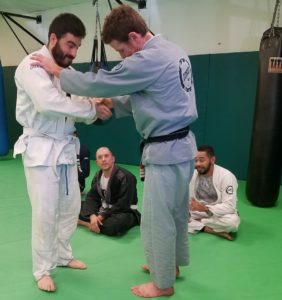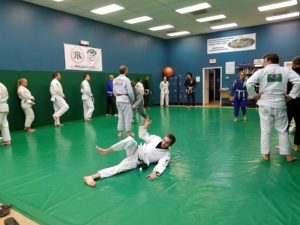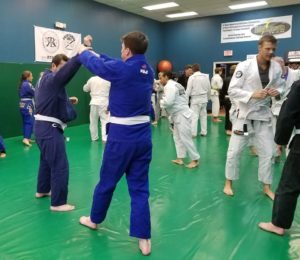Tips for the Absolute Novice
by: Daniel Frank
I started jiu jitsu by answering an advertisement in the newspaper. I was living in a foreign country and could not speak the language. I needed something to do with my limited free time and that advertisement appealed to me. I went to my first class without looking up what jiu jitsu was and without caring that I had no information going in. I was really a novice. I could be considered a sub-category of novice, if there was one. Since then I have seen thousands of novices don the gi for the first time. The following are some pieces of advice that might be able to help out the greenest of the new students.
Tabula Rasa
‘Tabula rasa’ is Latin for ‘blank slate’. In philosophy, the idea of this ‘blank slate’ can be traced from the writings Aristotle to Avicenna, to Ibn Tufail, to John Locke. The idea basically says that at birth the human mind is a ‘blank slate’ that has no rules for learning or processing data. The rules are then formed through the individual’s own experiences throughout their lifetime. This ‘blank slate’ idea can be very helpful for the novice jiu jitsu practitioner. If you come into your first class without any previous experience, then great, you are that ‘blank slate’ and are ready to learn jiu jitsu without anything holding you back. If you come in with some previous experience doing another form of grappling, or even another traditional martial art, then you need to erase your slate. It does not have to be completely erased, but don’t let your experience with those other forms hinder your experience learning jiu jitsu. At times, sticking to your old methods can help with a few techniques, but overall it slows your complete growth in jiu jitsu.
Listen With Your Ears, Not Your Mouth
 ‘Listen with your ears’ sounds like a very simple command to adhere to. It isn’t. So many people like to chime in with their opinion about everything at anytime. This is a good thing, in a limited manner. Questions help you to learn jiu jitsu. Ask your instructor plenty of questions about a technique you are learning, a movement that is hard for you to understand, or a drill that you are practicing. Do not get stuck on the ‘what if’ questions that interfere with a lesson being taught. If you are learning jiu jitsu at a qualified school, with expert instructors, then trust their instruction. These instructors have taken a large chunk of their life, not only to learn jiu jitsu, but to learn how to teach jiu jitsu to others. There are thousands of jiu jitsu moves and combinations of moves. There are variations of all of these moves that depend upon the size of an opponent, the timing of the move, the level of fitness or flexibility of one or both of the practitioners. The ‘what if’ questions would be helpful if the class had no time limit and the students in the class all had extensive jiu jitsu knowledge, but they are not so helpful for a class full of novice students. If you are that novice student, then listen with your ears, practice the techniques, and maybe ask your ‘what if’ question to the instructor after class.
‘Listen with your ears’ sounds like a very simple command to adhere to. It isn’t. So many people like to chime in with their opinion about everything at anytime. This is a good thing, in a limited manner. Questions help you to learn jiu jitsu. Ask your instructor plenty of questions about a technique you are learning, a movement that is hard for you to understand, or a drill that you are practicing. Do not get stuck on the ‘what if’ questions that interfere with a lesson being taught. If you are learning jiu jitsu at a qualified school, with expert instructors, then trust their instruction. These instructors have taken a large chunk of their life, not only to learn jiu jitsu, but to learn how to teach jiu jitsu to others. There are thousands of jiu jitsu moves and combinations of moves. There are variations of all of these moves that depend upon the size of an opponent, the timing of the move, the level of fitness or flexibility of one or both of the practitioners. The ‘what if’ questions would be helpful if the class had no time limit and the students in the class all had extensive jiu jitsu knowledge, but they are not so helpful for a class full of novice students. If you are that novice student, then listen with your ears, practice the techniques, and maybe ask your ‘what if’ question to the instructor after class.
Gather Resources
When I was a novice jiu jitsu student I had limited resources. Not only could I not speak the language of my instructor or training partners, but it was the year 2003. YouTube was not a thing yet. I couldn’t find a DVD online to watch in the comfort of my home. Jiu Jitsu Magazine was still quite a few years away. I had to work hard to get my education. The first book that I bought was ‘Brazilian Jiu Jitsu: Theory and Technique’ by Renzo and Royler Gracie. I dogeared and damaged that book until I finally had to buy another. I bought books by Jean Jacques and Rigan Machado and also a self-defense book by Royce and Charles Gracie. I was extremely happy that I could learn jiu jitsu in my own language to hold me over until I could understand another language. I was also in the stone age of online learning. I needed to use a site called jiujitsu.net and also Gracie Magazine online. Imagine taking a magazine, photocopying a page and then putting it online. That was it, stone age jiu jitsu learning, but it worked. I printed the techniques out, cut them up and pasted them into a notebook, and wrote notes beside the techniques. I took that limited knowledge to the mats and made the moves work for me. The novice student now has online services from their own academies, online services from world renowned jiu jitsu practitioners, YouTube videos from the experts to the weirdos filming in their driveway, and more books than you can fit into your library.
instructor or training partners, but it was the year 2003. YouTube was not a thing yet. I couldn’t find a DVD online to watch in the comfort of my home. Jiu Jitsu Magazine was still quite a few years away. I had to work hard to get my education. The first book that I bought was ‘Brazilian Jiu Jitsu: Theory and Technique’ by Renzo and Royler Gracie. I dogeared and damaged that book until I finally had to buy another. I bought books by Jean Jacques and Rigan Machado and also a self-defense book by Royce and Charles Gracie. I was extremely happy that I could learn jiu jitsu in my own language to hold me over until I could understand another language. I was also in the stone age of online learning. I needed to use a site called jiujitsu.net and also Gracie Magazine online. Imagine taking a magazine, photocopying a page and then putting it online. That was it, stone age jiu jitsu learning, but it worked. I printed the techniques out, cut them up and pasted them into a notebook, and wrote notes beside the techniques. I took that limited knowledge to the mats and made the moves work for me. The novice student now has online services from their own academies, online services from world renowned jiu jitsu practitioners, YouTube videos from the experts to the weirdos filming in their driveway, and more books than you can fit into your library.
Lastly, the best thing that a novice student can do to learn jiu jitsu is to not give up. Continue to go to your classes. If those classes are part of an intro course, then finish the course before moving on to more difficult classes. Take it slowly. There is no need to rush into the advanced classes, especially if you are a white belt. Take this time to learn as much as you can because once you attain the blue belt you cannot go back to white. Good luck!